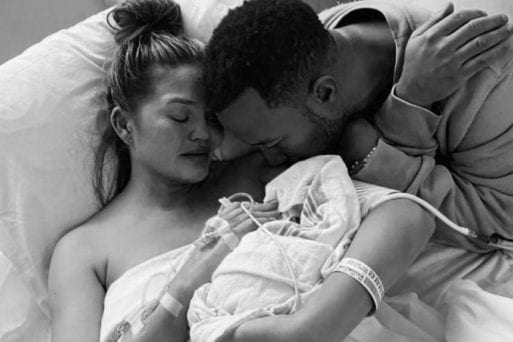 For days, Chrissy Teigen kept more than 45 million Instagram and Twitter followers worldwide apprised of complications in the pregnancy of her third child.
For days, Chrissy Teigen kept more than 45 million Instagram and Twitter followers worldwide apprised of complications in the pregnancy of her third child.
The model and TV personality shared scenes from a hospital stay — a worrisome blood clot, photos of hospital food, trying with musician husband John Legend to detect their baby’s heartbeat following a scare.
Then, on Sept. 30 came the sad news.
“We are shocked and in the kind of deep pain you only hear about, the kind of pain we’ve never felt before,” read the post, accompanied by a photo of a devastated Teigen in a hospital room. Despite a valiant attempt to save their son, baby Jack did not survive.
“Jack worked so hard to be a part of our little family, and he will be, forever,” she shared. “To our Jack — I’m so sorry that the first few moments of your life were met with so many complications, that we couldn’t give you the home you needed to survive. We will always love you.”
That simple act opened the floodgates, as men and women shared their own stories of child loss — of cradling stillborn babies, of fetuses delivered through labor who never drew breath, of beloved children lost in infancy.
Teigen and Legend’s openness will likely help them in the difficult months ahead, according to expert resources on pregnancy loss. But weeks later, the post is still empowering families to come forward with their own stories and, in doing so, provide a lifeline for those grieving in silence.
Miscarriage, stillbirth and infant loss is not uncommon — the Mayo Clinic estimates 10% to 20% of all pregnancies end prematurely, while the Centers for Disease Control and Prevention recorded more than 21,000 cases of infant mortality in 2018 and report 24,000 stillbirths nationwide each year. (The World Health Organization puts the global total at 2.6 million.)
October’s Pregnancy and Infant Loss Awareness Month recognizes those still in mourning and honors children like Jack, who are gone but will forever be daughters and sons. The campaign provides a meaningful and relevant sharing opportunity some researchers suspect extends far beyond the calendar month.
https://twitter.com/ThorntonAbigail/status/1311711253505564672
In a 2018 study conducted at Pennsylvania’s Drexel University, co-authors Nazanin Andalibi and Andrea Forte looked at how and why women who experienced pregnancy loss chose to disclose the news on social media, particularly Facebook, and how the act fostered a wider sense of connection and support.
Women had different motivations for sharing online. Some wanted to honor their experiences. Others found it helped them gain control of the narrative by placing the loss within the broader context of their lives, while still others found sharing and receiving social support aided their healing.
One study subject used Pregnancy and Infant Loss Awareness Month as a vehicle for discussing her own miscarriage after she’d experienced a loss and found herself wishing she could talk to someone who’d lived through it.
“I was putting it out there just in support of anybody who might be experiencing a miscarriage and feel alone, because I felt very alone,” she told the study’s authors.
Her intention was “not only to let people know that it happened to me and to acknowledge the loss publicly as a way of healing, but also to let anybody know that if they were going through it themselves and wanted someone to talk to, I was available for that.”
The study determined social media campaigns — including Pregnancy and Infant Loss Awareness Month — provide a helpful and timely way for people to share stories of loss, even several years later.
“Awareness campaigns, the efficiency of one-to-many disclosures and opportunities for anonymous lower-risk disclosures elsewhere contribute to women’s decisions to disclose pregnancy loss experiences on identified [social networking sites] which, through the mechanism of network-level reciprocation, creates an increasingly disclosure-friendly context for those who come after,” it concluded.
In her post, Teigen thanked “everyone who has been sending us positive energy, thoughts and prayers,” and acknowledged the only way out of one’s grief is through it.
“On this darkest of days, we will grieve, we will cry our eyes out,” she wrote. “But we will hug and love each other harder and get through it.”

 A Pregnancy Loss Felt Round the World
A Pregnancy Loss Felt Round the World


 How Dare You Die Now!
How Dare You Die Now!

 “Help Me, Helen”
“Help Me, Helen”














